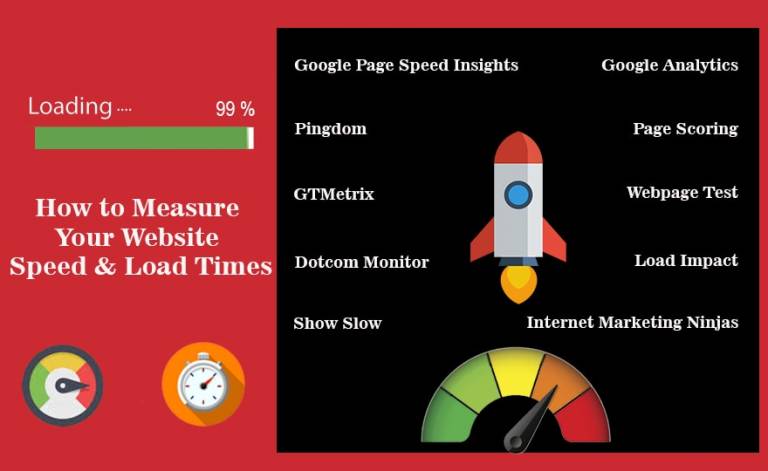How to Measure Your Website Speed and Load Times
10 Ways to Measure Page Loading Speeds
Google Analytics – You might be using Google Analytics for other purposes. But it also contains a section which tells you about the page loading speeds of your website. You can find it under the ‘Behavior’ section. Instead of giving you an overall suggestion, this tool comes up with pagewise suggestions to help improve loading speeds for those particular pages.
Google Page Speed Insights –It’s almost like getting your results at the click of a button. You need to type in the URL in the search box, and then click on ‘Analyze’. You would get a complete report which would give a roundup of speeds of all the pages on the website, along with a view of possible user experience. You will also get suggestions for improving the weak / slow pages, in the form of recommendations listed on a separate page.
Pingdom – This tool gives you an option of four locations worldwide (New York, San Jose, Stockholm and Melbourne) from where your website can be tested. Unlike many other similar tools, the detailed results are not immediately displayed on the page, but you get an option to download or share the results. The page only contains a summary. One thing different from other tools is that you get a comparative score with all other websites. For example, on this tool, http://facebook.com/ was marked as faster than 50% of other websites.
Internet Marketing Ninjas – Right now, the page for this tool was itself undergoing maintenance, so we couldn’t actually do a test run to see how it compares to other tools. But the landing page did let us know about this tool’s features. You can use this tool to compare the loading times for the same website using different internet speeds.
You can also use this tool to pinpoint the slowest and fastest pages on your website, so you know exactly where the problem needs to be addressed. This tool also provides an option of comparing loading speeds of two web pages side by side, so you can use this tool for an A/B kind of testing for two versions of your webpage.
Show Slow – This is an open source tool which is managed on Github. As a result, it has a vibrant community of users and contributors whom you can consult regarding the usage of this tool and the results it provides. It shows you the consolidated results of three different page speed analysis tools. This tool can be downloaded on to your desktop if you do not want to share the results with the world. You not only get the status of your website, but also useful suggestion to fix the problem areas.
Webpage Test – When you log on to the page, you are presented with a long list of testing partners across the world, which increases your confidence about the results. You can choose between simple and advanced testing, and also select a visual comparison mode. You can pinpoint three dimensions of your page test on this tool- the location of the test, the browser you wish to test for, and the device as well.
The tool would carry out 3 test runs in the advanced test option, so you might need to wait for a few seconds more for the results. It provides a comparison of the load times of first attempt and second attempt by the visitor.
Dotcom Monitor – This website offers a number of options, like monitoring of web based apps, testing of maximum and minimum page load stress, monitoring of website performance, and also assessment of internet services. You can check the load times of pages from different locations around the world. You can easily see the quickest and the slowest pages on your website, and understand your website’s status on different elements using the waterfall charts provided. One difference with other tools is that you get push notifications regarding any performance issues that have been detected at any point of time.
Load Impact – The advantage of this tool is that it can fit in well with most of the common continuous delivery and integration tools used by developers. The results dovetail into the development workflow. The great thing for non-expert users is that each part of the results page will throw up a pop up box explaining the metric when you run your mouse over it.
We were a little disappointed by the time it took to generate a result, but once the results page is up, you can see it assess your webpage in real time, including active TCP connections, bandwidth usage etc. This tool has several results which are free for up to 50 VUs five times a month. If you need more results more frequently, then you need to create an account.
GTMetrix – The unique feature of this tool is that it also uses results of other tools to give you a composite outcome. The report is just not a score of the times and viewability. It gives you a score on 100 of scores of smaller parameters which affect page loading speeds, like image optimization, minimizing of redirects, inline CSS and so many others. These parameters are listed in decreasing order of importance, so that you can get an easy view of which issues to address first.
Page Scoring – It might take you some time to locate this page, because there are some more aptitude testing tools which use the same or similar name. Also, the results page is not as fancy or colorful as some of the other tools listed here. In a simple and no-frills manner, it gives you the most important results that would help you assess your website.
We liked the unique visitors, unique page views, and also the estimated income and valuation that this tool provides. The usual suspects – connecting time, time taken to load, as also the time taken to redirect to a certain page – are all available in the results page.
How to Improve Your Website’s Page Loading Speed
Most of the tools detailed above also provide their own recommendations regarding how to fix any issues they locate on your website. Most websites have seen a rapid improvement in page loading speeds when some or all of these areas were improved upon :
- Compression of website
- Optimization of images
- Improving your website’s code
- Using metadata and optimizing scripts
- Using a better web hosting service
- Using a good content management system





Live A Reply